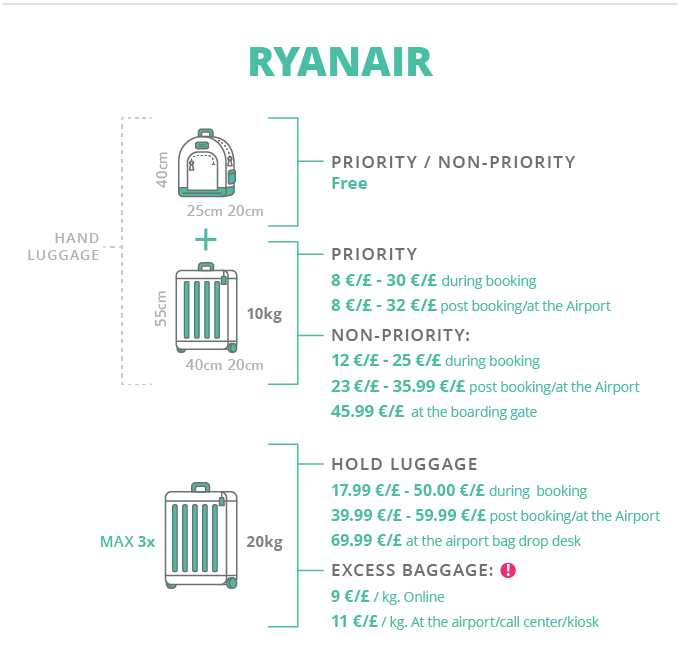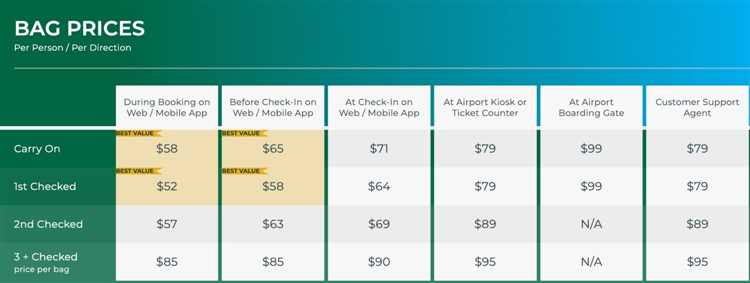When planning a trip, it’s important to consider the cost of baggage fees. Airlines around the world have different policies and pricing structures for checked and carry-on bags. Knowing how much these fees can impact your travel budget will help you make informed decisions and choose the best airline for your needs.
Baggage fees vary depending on the airline, destination, and ticket class. Some airlines have a fixed fee for each piece of checked baggage, while others charge based on weight or size. On top of that, there are additional fees for oversized or overweight bags. It’s crucial to familiarize yourself with the baggage policies of the airline you plan to fly with to avoid any surprises at the airport.
Fortunately, you don’t have to spend hours researching each airline’s baggage fees individually. Our website provides up-to-date information on the latest baggage fees from a wide range of airlines. Whether you’re traveling domestically or internationally, economy or business class, we have all the information you need right at your fingertips.
Don’t let baggage fees catch you off guard and eat into your travel budget. Stay informed and plan ahead by checking our comprehensive database of baggage fees. With this valuable information, you can make the most cost-effective choices for your trip and have a worry-free travel experience.
- How much are baggage fees?
- Checked baggage fees
- Overweight and oversized baggage fees
- Discover the latest baggage fees
- Important considerations for baggage fees
- Understanding airline policies
- Baggage allowance
- Baggage fees
- Special items and restricted items
- Tips for avoiding extra baggage fees
- Question-answer:
- What are the baggage fees for domestic flights within the United States?
- Do all airlines charge baggage fees?
- What are the baggage fees for international flights?
- Are there any airlines that offer free baggage?
- What are the restrictions on baggage size and weight?
- What are the current baggage fees for airline X?
How much are baggage fees?

Baggage fees can vary depending on the airline and the specific details of your trip. It’s important to check with your airline before you travel to understand their current baggage fee policies. However, here are some general guidelines to help you estimate the potential costs:
Checked baggage fees
If you plan to check in your bags, most airlines will charge a fee for each checked bag. The cost can range from $25 to $75, depending on the airline and the destination. Some airlines may offer a lower fee for the first checked bag and a higher fee for additional bags.
Overweight and oversized baggage fees

If your bags exceed the weight or size limits set by the airline, you may be subject to additional fees. These fees can be quite steep, ranging from $50 to $200 per bag. It’s important to check the baggage restrictions of your airline and pack accordingly to avoid these extra charges.
Note: It’s worth noting that some airlines may have different baggage fee policies for international flights compared to domestic flights. Additionally, fees may be waived or discounted for certain types of passengers, such as frequent flyers or elite members of the airline’s loyalty program.
Remember to always check with your airline directly for the most accurate and up-to-date baggage fee information.
Discover the latest baggage fees
When traveling by air, it’s important to familiarize yourself with the current baggage fees to avoid any surprises or additional charges. Each airline has its own policies and fees regarding checked baggage, carry-on bags, oversized items, and excess weight.
Before you begin packing for your trip, make sure to check the airline’s website or contact their customer service to get the most up-to-date information on baggage fees. This will help you plan and budget accordingly, ensuring a smooth and stress-free travel experience.
Many airlines charge a fee for checked baggage, which can vary based on factors such as destination, class of service, and loyalty program status. It’s important to note that these fees are often per bag, so if you’re planning to check multiple bags, the costs can add up quickly.
Carry-on bags, on the other hand, are typically allowed free of charge within certain size and weight limits. However, it’s essential to double-check these limits, as some airlines may have stricter policies or additional fees for oversized or overweight carry-on bags.
If you have oversized items, such as sports equipment or musical instruments, additional fees may apply. These items often require special handling and may need to be checked in as oversized baggage or transported separately. Again, it’s recommended to check with your airline beforehand to avoid any surprises or inconveniences.
Lastly, if your checked baggage exceeds the allowed weight limit, you may need to pay an excess weight fee. This fee can be quite steep and is often calculated per kilogram or pound over the limit. To avoid this fee, make sure to pack light and weigh your bags before heading to the airport.
In conclusion, it’s crucial to research and be aware of the latest baggage fees charged by your airline before your trip. This will save you time, money, and potential stress at the airport. Remember to check the airline’s website or contact their customer service for the most accurate and up-to-date information. Happy travels!
Important considerations for baggage fees
When planning your trip and budgeting for baggage fees, it is important to keep a few things in mind.
- Weight restrictions: Most airlines have weight restrictions for checked baggage. Make sure you know the maximum weight allowed by your airline and pack accordingly. If your bag exceeds the weight limit, you may have to pay additional fees.
- Baggage size: In addition to weight restrictions, airlines also have size restrictions for both checked and carry-on baggage. If your bag exceeds the allowed dimensions, you may have to check it or pay additional fees for oversized baggage.
- Number of bags: Many airlines have different fee structures based on the number of bags you are checking. Be sure to check the baggage policy of your airline to determine how many bags are included in your ticket price and how much you will have to pay for additional bags.
- Excess baggage fees: If your checked baggage exceeds the allowed weight or size limits, you will likely have to pay excess baggage fees. These fees can vary greatly depending on the airline, so make sure you are aware of the costs before you arrive at the airport.
- Sports equipment and special items: If you plan on traveling with sports equipment, musical instruments, or other special items, be aware that most airlines have specific policies and fees for these items. Make sure to check the policy beforehand to avoid unexpected charges.
- International travel: If you are traveling internationally, be aware that baggage fees can vary depending on the airline and the destination. Some airlines may include baggage allowances in their ticket prices, while others may charge separate fees.
- Loyalty program benefits: If you are a member of an airline’s loyalty program, you may be entitled to certain baggage benefits, such as waived fees or increased baggage allowances. Check with your airline to see if you qualify for any additional benefits.
By taking these important considerations into account, you can better plan your trip and budget for any baggage fees that may be necessary.
Understanding airline policies
When it comes to traveling by air, it’s important to understand the policies that each airline has in place. These policies can vary from one airline to another, so it’s crucial to do some research before booking your tickets. Here are a few key areas of airline policies to consider:
Baggage allowance

One of the most important policies to be aware of is the baggage allowance. Each airline has specific rules regarding the size, weight, and number of bags that you can bring on your flight. Exceeding these limits can result in additional fees or even being denied boarding. It’s essential to check the baggage allowance for your specific airline and ticket type before packing your bags.
Baggage fees
Another significant aspect of airline policies is baggage fees. Many airlines charge fees for checked bags, and the cost can vary depending on factors such as destination, ticket class, and loyalty status. To avoid any surprises, make sure to check the baggage fees for your airline and factor them into your travel budget.
Additionally, some airlines offer a complimentary baggage allowance for certain ticket types or loyalty program members. Knowing the specific rules and benefits associated with your ticket can save you money and make your travel experience more convenient.
Special items and restricted items
Airlines also have policies in place for carrying special items such as sports equipment, musical instruments, or fragile items. These items may have specific requirements or additional fees, so it’s crucial to check the policies beforehand if you plan to bring any of them on your journey.
Similarly, certain items may be restricted or prohibited from being carried on board or checked in. This includes items such as weapons, flammable substances, or certain types of liquids. Familiarize yourself with the restricted items list to ensure compliance with airline policies and avoid any issues at the airport.
By understanding airline policies, you can have a smoother and more hassle-free travel experience. Take the time to research and familiarize yourself with the specific policies of your chosen airline, so you can pack and travel confidently.
Tips for avoiding extra baggage fees
When traveling by air, it’s important to be aware of baggage fees that can quickly add up, eating into your travel budget. Here are some tips to help you avoid those extra fees:
- Pack light: The easiest way to avoid baggage fees is to pack light and only bring the essentials. Consider making a packing list to ensure you’re only bringing what you truly need for your trip.
- Use a carry-on: Opting for a carry-on bag instead of checking a suitcase can save you money. Most airlines allow passengers to bring one carry-on bag for free, so take advantage of this policy.
- Know your airline’s baggage policy: Before you book your flight, make sure to familiarize yourself with your airline’s baggage policy. Different airlines have different weight and size restrictions, so be sure to adhere to these guidelines to avoid extra fees.
- Weigh your luggage before heading to the airport: Invest in a small luggage scale to weigh your bags at home. This way, you can ensure that you are under the weight limit before you even leave for the airport. If your bags are over the limit, you can adjust your packing accordingly.
- Avoid overweight and oversized bags: Airlines often charge extra fees for bags that exceed weight or size limits. Be mindful of these restrictions and avoid packing excessive items or oversized belongings to avoid incurring extra expenses.
- Consider shipping your luggage: If you are traveling with heavy or bulky items, it may be more cost-effective to ship them to your destination rather than paying expensive baggage fees. Look into shipping options and compare prices to see if this is a viable choice for your trip.
- Take advantage of airline loyalty programs: Many airlines offer loyalty programs that provide perks to frequent flyers, including waived baggage fees. If you frequently fly with a particular airline, consider signing up for their loyalty program to enjoy benefits like free checked bags.
- Share luggage with travel companions: If you are traveling with friends or family, consider sharing luggage space. By consolidating your belongings, you can potentially avoid extra fees for additional bags.
- Book flights with generous baggage policies: When comparing airlines and flight options, take into account their baggage policies. Some airlines may offer more generous allowances or lower fees, making them a better choice for travelers who tend to bring more luggage.
By following these tips, you can minimize the chances of incurring extra baggage fees and make your travel experience more affordable and stress-free.
Question-answer:
What are the baggage fees for domestic flights within the United States?
For domestic flights within the United States, baggage fees vary depending on the airline. However, on average, the fees range from $25 to $35 for the first checked bag and increase for additional bags.
Do all airlines charge baggage fees?
No, not all airlines charge baggage fees. Some airlines, especially low-cost carriers, may include baggage in the ticket price, while others may charge fees for both checked and carry-on bags. It is important to check the baggage policy of the specific airline you are flying with.
What are the baggage fees for international flights?
Baggage fees for international flights can vary significantly depending on the airline and destination. On average, fees for the first checked bag can range from $50 to $100, and fees for additional bags are usually higher. It is recommended to check with the airline for the most up-to-date fees.
Are there any airlines that offer free baggage?
Yes, some airlines do offer free baggage as part of their policy. This usually depends on the type of ticket purchased and the airline’s specific rules. Some full-service airlines may include at least one checked bag in the ticket price, while others may offer free baggage for certain loyalty program members.
What are the restrictions on baggage size and weight?
The restrictions on baggage size and weight vary among different airlines. Typically, there are limits on both the dimensions (length, width, and height) and weight of checked and carry-on bags. It is important to check the specific airline’s policy to ensure your bags comply with the requirements to avoid additional fees or issues at the airport.
What are the current baggage fees for airline X?
The current baggage fees for airline X are $25 for the first checked bag and $35 for the second checked bag.